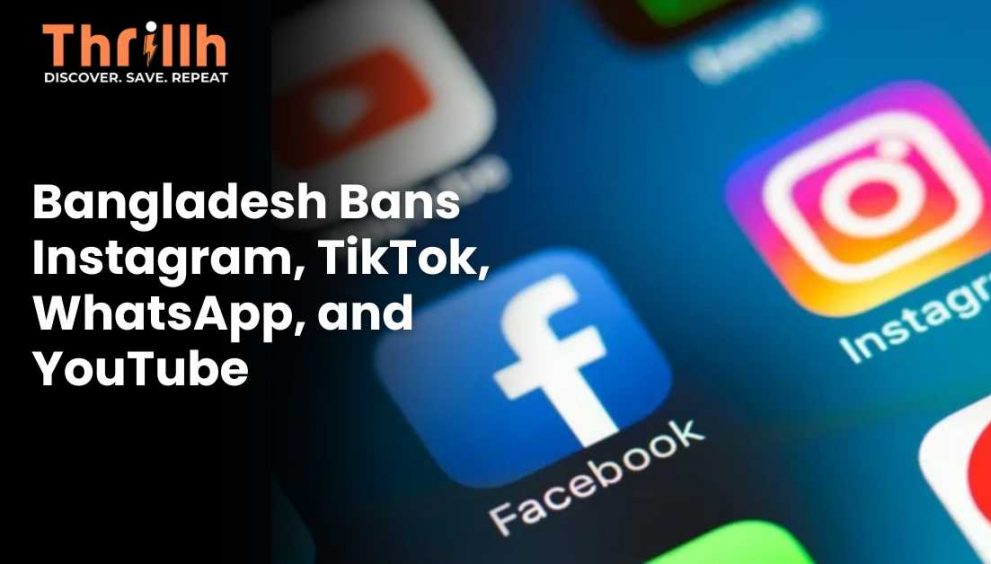Overview
Bangladesh recently announced a nationwide ban on several major social media platforms, including Instagram, TikTok, WhatsApp, and YouTube. This decision aims to address various issues, including national security, misinformation, and inappropriate content. The move has sparked widespread discussion and debate about its implications for free speech, connectivity, and the digital economy.
Why the Ban?
The government of Bangladesh has cited several reasons for the ban:
- National Security: Concerns about the use of social media platforms for organizing anti-government activities and spreading propaganda have been paramount. The government believes that limiting access to these platforms can help mitigate these risks.
- Misinformation and Fake News: With the rapid spread of misinformation and fake news on social media, the government aims to curb the dissemination of false information that could destabilize the country.
- Inappropriate Content: Platforms like TikTok and YouTube are often criticized for hosting content that may not align with the cultural and social norms of Bangladesh. The ban is seen as a way to protect citizens, especially the youth, from exposure to such content.
Impact on Citizens
The ban on these popular social media platforms has significant implications for the citizens of Bangladesh:
- Communication: WhatsApp is a primary communication tool for many Bangladeshis. Its ban could disrupt personal and business communication, affecting daily life and economic activities.
- Digital Economy: Many individuals and businesses rely on Instagram and YouTube for marketing and monetization. The ban may impact small businesses and content creators who depend on these platforms for income.
- Access to Information: YouTube serves as a crucial source of information and educational content for many. Restricting access could limit learning opportunities and access to diverse perspectives.
Global Reactions
The ban has attracted global attention, with reactions varying widely:
- Human Rights Concerns: International human rights organizations have expressed concerns over the restriction of freedom of speech and access to information.
- Tech Industry Response: The affected companies have called for dialogue with the Bangladeshi government to discuss potential solutions and address concerns.
- Regional Implications: The ban could set a precedent for other countries in the region to consider similar measures and influence digital policy trends.
Possible Outcomes
The long-term effects of this ban depend on several factors:
- Government Negotiations: Continued discussions between the government and social media companies could lead to policy changes or adaptations that address the government’s concerns while restoring access.
- Public Response: Citizen reactions and potential protests could influence government decisions, especially if the ban significantly impacts the economy and daily life.
- Technological Adaptation: Users may seek alternative platforms or methods, such as VPNs, to bypass restrictions, which could prompt further governmental measures.
Conclusion
The ban on Instagram, TikTok, WhatsApp, and YouTube in Bangladesh highlights the complex balance between national security and freedom of expression. As the situation evolves, it will be crucial for all stakeholders to engage in constructive dialogue to find solutions that uphold both safety and digital rights.
FAQs
Why were these specific platforms banned in Bangladesh?
These platforms were banned due to concerns about national security, misinformation, and inappropriate content that the government believes could destabilize the country .
How will this ban affect businesses in Bangladesh?
The ban could negatively impact businesses that rely on these platforms for marketing and communication, particularly small enterprises and digital content creators .
Is there a possibility of the ban being lifted?
While the ban is currently in place, ongoing negotiations and public response could lead to policy changes or adaptations that might restore access in the future .
What are the alternatives for affected users?
Users might turn to alternative communication and social media platforms or use technological solutions like VPNs to bypass the restrictions. However, this could prompt further government actions .
What are the global implications of this ban?
The ban could influence digital policy trends in the region and raise international concerns about freedom of speech and access to information.
References
- HRW.org
- Misinformation and Fake News Impact
- Cultural Norms and Content Appropriateness
- Impact on Communication and Economy
- International Human Rights and Tech Industry Response
- Government Discussions and Public Response






Anand
11th Aug 2024As for the best whiskey in the world, an Indian whiskey has surpassed a number of foreign brands.
Real Estate
29th Oct 2024Real Estate Awesome! Its genuinely remarkable post, I have got much clear idea regarding from this post . Real Estate
Packachange
14th Nov 2024Packachange I truly appreciate your technique of writing a blog. I added it to my bookmark site list and will